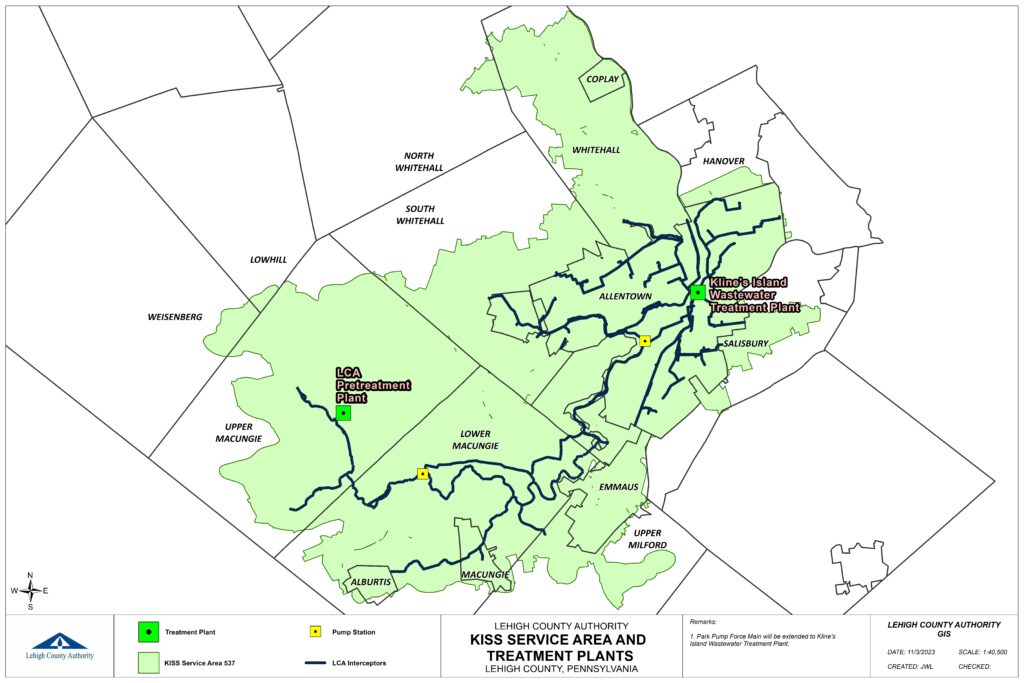Planning for the Region’s Future Sewer Needs
About the wastewater system
LCA operates the wastewater system that serves 15 municipalities in western and central Lehigh County. Through a network of wastewater interceptors and pump stations, along with the help of gravity, the regional system transports wastewater to the City of Allentown for final treatment at the Kline’s Island Wastewater Treatment Plant.
LCA owns and operates a pre-treatment plant located in Fogelsville, which provides pre-treatment for industrial waste, prior to it heading to the City of Allentown for treatment as well.

Learn about the Regional Sewer Plan & Important Dates
Follow along as information is shared with municipal partners and the public about the regional sewer system needs and the plan to address them. Since the 1960s, the 15 municipalities have collaborated to build sewer infrastructure to meet the region’s needs. Now, we are creating a plan to address the major system upgrades needed. This is a critical plan for every community in the region—it’s the largest investment our region has ever made to protect public health and the environment.
Visit www.lehighcountysewer.org
Sanitary sewer overflows result in EPA Administrative Order
In 2009, the U.S. Environmental Protection Agency (EPA) issued an Administrative Order to all fourteen municipalities served by the regional sewer system in our area, including LCA, the City of Allentown, and all outlying municipalities that connect to the system. The order required all municipalities to make significant improvements to the sewer systems to eliminate sewer overflows, which can happen when rainwater, runoff from floods, melting snow, or other sources overwhelm the existing sewer system. A number of improvements were completed by LCA and the municipalities with required reporting to the EPA. The Administrative Order was lifted in March 2019. Oversight was returned to the Pennsylvania Department of Environmental Protection (PA DEP).
Due to the system issues and sewer overflows, PA DEP ordered a “537 Plan” to be developed by March 2025, covering the period through 2050. Pennsylvania Act 537 is the Sewage Facilities Act, which requires that all municipalities develop, revise, and implement Official Sewage Facility Plans (“Act 537 Plan” or simply “Official Plan”). PA DEP required that an “Interim 537 Plan” be completed to address the immediate period covering from 2021 to 2025.
The Interim 537 Plan details the region’s corrective action plan related to the hydraulic overload condition in 2019 after Pennsylvania received the most annual rainfall since data began being collected in 1895. As a result of the hydraulic overload condition, the Kline’s Island Sewer System (KISS) Signatories working group, with the assistance of ARRO Consulting, developed an Interim Plan for the period of 2021 to 2025.
Interim 537 Plan
The Interim 537 Plan, linked below, was approved on 6/25/21. The final plan, which will cover through 2050, is due to the PA Department of Environmental Protection (DEP) in March 2025.
DEP Plan Approval Correspondence – LCA Interim Act 537 Plan – 6-25-2021
Trexlertown Act 537 Special Study
A Special Study is being done to address sewage capacity needs within the Western Lehigh Interceptor (WLI) near Trexlertown. The interceptor experiences dry-day surcharging and wet-weather overflows during intense rain events. Lehigh County Authority has developed alternatives to temporarily address this situation until a long-term solution can be developed during the preparation of the regional long-term Act 537 Plan.
Click here to view, download, or print a copy of the plan submitted to PA DEP (June 2022).
Click here to read the PA DEP approval letter (Jan. 2023)
Ongoing Preventive Maintenance
& System Improvements
LCA regularly works on preventive maintenance and system improvements. Our work includes (but is not limited to):
- Working with all the municipalities in our service area to develop strategies to reduce clear water leakage into our sewer system, called “Inflow and Infiltration,” which causes sewer system overflows during periods of heavy rain.
- Flow monitoring to determine where the leakage is coming from.
- Some communities in LCA’s service area are utilizing “smoke testing” to help find the source of sewer leaks. Download LCA’s Fact Sheet about Smoke Testing. You can also visit the Charleston Water System website to see a short YouTube video on smoke testing.
- Bolting down manholes and other manhole repairs to prevent rainwater from entering the system
- Camera / video taping of sewer lines to look for cracks and leaks
- Repairing cleanout caps
- Customer outreach and in-home inspections to find unauthorized connections, such as sump pumps and roof drains.